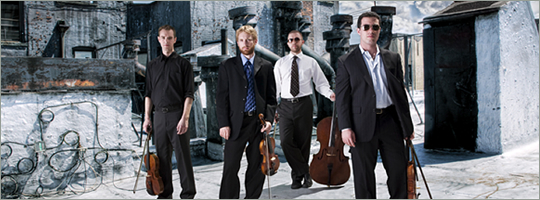

+ Google Map
As part of the ongoing Soundfield program series called EurEthos the esteemed German composer Helmut Lachenmann visits Philadelphia for the first time. The EurEthos series explores the complex cultural relationships between Europe and the USA through concerts, community dialog and publications.
Produced by Soundfield, NFP and Slought Foundation and presented with support from Bowerbird, U Penn and Temple University. The programs have been made possible in part by a grant from the Argosy Foundation. <strong>The concert will be proceeded by a talk at the Slought Foundation – details below.
JACK QUARTET
John Pickford Richards
Ari Streisfeld, violin
Christopher Otto, violin
Kevin McFarland, cello
Praised for its "powerhouse playing" by the Chicago Sun-Times, the <strong>JACK Quartet</strong> maintains a steady appetite for today’s most demanding string quartet repertoire. Comprising violinists Christopher Otto and Ari Streisfeld, violist John Pickford Richards, and cellist Kevin McFarland, the quartet has given high-energy performances in Europe and North America including appearances at Carnegie Hall, La Biennale di Venezia, the Lucerne Festival, and the Festival Internacional de Musica Contempor de Micho
The members of the quartet met while attending the Eastman School of Music, where in addition to learning standard and contemporary repertoire they pursued period, non-western, and popular performance styles. The quartet has studied with the Arditti Quartet at the Pro-Bio Foundation Summer School for Contemporary Quartet Music, the Kronos Quartet at the Weill Music Institute at Carnegie Hall, and members of the Ensemble Intercontemporain at the Lucerne Festival Academy.
The commissioning and performance of new works for string quartet is integral to the JACK Quartet’s mission, leading them to work closely with composers Helmut Lachenmann, Wolfgang Rihm, Matthias Pintscher, Aaron Cassidy, Aaron Travers, Roberto Rusconi, Cristian Amigo, Robert Wannamaker, Randall Woolf, Kirsten Broberg, Alexandra du Bois, and Samuel Adler.
The quartet has worked with composition students at Northwestern University, the University of Illinois at Urbana-Champaign, and in Italy for the Intrasonus Project. In addition to working with composers and performers, the JACK quartet seeks to broaden and diversify the potential audience for new music through educational presentations designed for a variety of ages, backgrounds, and levels of musical experience.
Helmut Lachenmann was born in Stuttgart and after the end of the Second World War (when he was 11) started singing in his local church choir. Showing an early aptitude for music, he was already composing in his teens. He studied piano with J Uhde and composition and theory with Johann Nepomuk David at the Stuttgarter Musikhochschule from 1955 to 1958 and was the first private student of the composer Luigi Nono in Venice from 1958 to 1960. He also worked briefly at the electronic music studio at the University of Ghent in 1965, but thereafter focused almost exclusively on purely instrumental music.
Lachenmann has referred to his compositions as musique concregrave;te instrumentale, implying a musical language that embraces the entire sound-world made accessible through unconventional playing techniques. According to the composer, this is music in which the sound events are chosen and organized so that the manner in which they are generated is at least as important as the resultant acoustic qualities themselves. Consequently those qualities, such as timbre, volume, etc., do not produce sounds for their own sake, but describe or denote the concrete situation: listening, you hear the conditions under which a sound- or noise-action is carried out, you hear what materials and energies are involved and what resistance is encountered. His scores place enormous demands on performers, due to the plethora of techniques that he has invented for wind, brass and string instruments.
His more important works include the music theatre work Das Mchen mit den Schwefelhlzern (1990-96, after Hans Christian Andersen, Leonardo da Vinci and Gudrun Ensslin), the orchestral pieces Schwankungen am Rand (1974-75, for eight brass, two electric guitars, two pianos, four thunder sheets, and 34 strings), Accanto (1975-76, for clarinet, large orchestra and tape) and NUN (1997-99, for flute, trombone, male chorus, and large orchestra), the ensemble works Mouvement (- vor der Erstarrung) (1982-84, for three ad hoc players and 14 players) and …zwei Gefuumlhle…quot, Musik mit Leonardo (1992, later incorporated in Das Mdchen mit den Schwefelhoumllzern, after Leonardo da Vinci, for two speakers and 22 players) and three string quartets (Gran Torso, 1971, revised 1976, 1988; Reigen seliger Geister, 1989; Grido, 2001), as well as other orchestral, ensemble and chamber works and six piano pieces.
He has regularly lectured at Darmstadt since 1978 and important among his many positions as a teacher was his term as professor of composition at the Stuttgarter Musikhochschule from 1981 to 1999. He is also noted for his many articles, essays and lectures, many of which appear in Musik als existentielle Erfahrung (Music as Existential Experience) (Breitkopf Haumlrtel, Wiesbaden, 1996).
Lachenmann was awarded with many distinguished prizes such as the Bach-prize of Hamburg (Bach-Preis der Freien und Hansestadt Hamburg) in 1972 and the Ernst von Siemens Music Prize in 1997.
In spring 2008 he was appointed Fromm Visiting Professor at the Music department at Harvard University.
- This event has passed.
